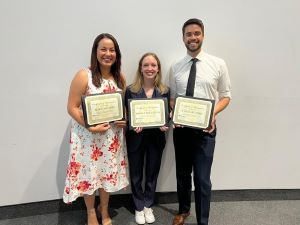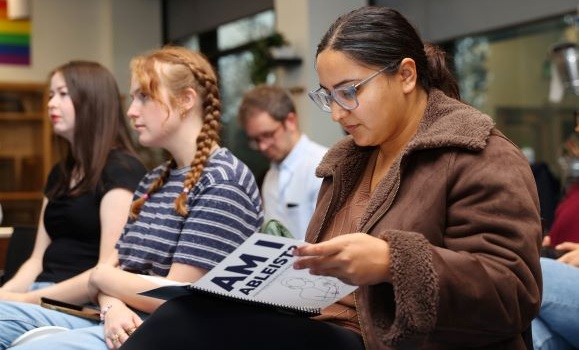Three recent Dalhousie graduates can add award winning author and advocate to their resumes.
Drs. Abbey MacLellan, Marihan Farid, and Zachary Ford, who wrote, developed and designed the book “Am I Ableist? Disability Awareness in Healthcare,” received the Curriculum Innovation Award at the American Academy of Developmental Medicine and Dentistry (AADMD) conference in Chicago, Illinois in early June.
Their award-winning e-book, which they toiled over for the final three years of their medical school training, has been viewed by more than 15,500 people and has been integrated into medicine and allied health curriculums across North America. The book helps students understand their views on disability, explore potential biases, and recognize how these biases may influence their health-care delivery.
Empowering trainees
Motivated to fill gaps in disability education, the three co-authors set out to empower health-care trainees to become more inclusive, respectful, and effective in their practice, ultimately improving the quality of care for individuals with disabilities.
“The inspiration for the book arose from our experiences as medical students,” says Dr. Farid. “A pivotal moment was during a clinical rotation when we saw a patient with a disability receive suboptimal care due to misconceptions and biases held by the medical team. This highlighted the urgent need for comprehensive disability education within the health-care curriculum.”
Dr. MacLellan was also inspired by her younger sister who has cerebral palsy and is currently completing a master’s in social work and works for disability justice and accessibility.
“From a young age we had so many conversations about ableism, disability and her advocacy efforts,” says Dr. MacLellan “I wanted to continue this work teaching others, specifically medical peers. Once in medical school, I realized a resource with these themes was needed, and when it didn’t exist, we decided to build it ourselves.”
With the support and encouragement of disability advocates and organizations, the three authors extensively researched key areas where disability education was lacking in medical training. Collaborating with the Regional Residential Services Society (RRSS) through the Dalhousie Service Learning Program, they held focus groups to gain insights from individuals with disabilities, which shaped the book's content.
 After multiple drafts and feedback from disability advocates across Canada, they finalized the content and worked to transform the document into an interactive e-book with exercises and case studies.
After multiple drafts and feedback from disability advocates across Canada, they finalized the content and worked to transform the document into an interactive e-book with exercises and case studies.
A central theme of the book is helping individuals identify the model of disability they are using and understand how they are applying it to their clinical interactions. The book emphasizes implicit bias and self-reflection through exercises, prompting readers to examine their biases and attitudes towards people with disabilities, fostering empathy and patient-centered care.
“The activities in the book challenge readers to think critically about their assumptions and decision-making processes,” says Dr. Farid. “By providing concrete examples of respectful language, accessible practices, and inclusive care, it equips health-care professionals with the tools they need to create a more empathetic and effective health-care environment.”
Challenging assumptions
The integration of “Am I Ableist? Disability Awareness in Healthcare” into medical and allied health curriculums was driven by a goal to maximize student engagement and resulted from proactive outreach, strategic partnerships, and the recognized need for better disability education.
Here at Dalhousie, “Am I Ableist” serves as a resource for students and tutors working with the newly diversified cases, and is included in the first-year medicine professional competency cases. It has been incorporated into a tutorial for medical students at the University of Saskatchewan, as well as in the Disability Supports and Services and Licensed Practical Nursing programs at the Nova Scotia Community College. It is also part of the first-year nursing syllabus at Trent/Fleming School of Nursing and the University of Toronto Medical School Clinical Skills Curriculum.
Dr. MacLellan emphasizes that the goal has always been to maximize student engagement by integrating the resource into curriculums. Designed to be under 20 pages with small, digestible chapters, the resource offers flexibility for use in university programs.
“The response from educational institutions has been overwhelmingly positive,” says Dr. Farid. “Students have also provided positive feedback and shown great appreciation for the opportunity to engage with real-world scenarios and reflective exercises that challenge their assumptions and broaden their understanding.”
Dr. Lynette Reid, who led the case diversification for Med1/2 tutorials as part of the Case Diversification Working Group, says that recent research confirms what disability rights groups have been saying.
“Without the skills to provide clinical care to persons with disabilities, and without the self-reflection necessary to understand assumptions and biases, disabled patients aren’t receiving care of equal quality. This has been an excellent resource for the curriculum development work we did with the Case Diversification Project, and it has so much more potential that I hope the program will follow up on.”
Changing mindsets
For three years, Drs. Farid, MacLellan, and Ford juggled their medical school studies and individual responsibilities with authoring and designing “Am I Ableist.” They are hoping their hard work will fundamentally transform how disability is perceived and addressed within health-care education and practice.
Dr. MacLellan echoes: “What makes this resource unique are the opportunities built into the content for inner reflection and application to one’s own clinical role and health-care setting. It makes the learning much more active and personal.” By educating students early in their training, they hope to instill a mindset of empathy, respect, and patient-centered care that will carry through into their professional careers.
Now resident doctors in three Dalhousie programs, the co-authors are excited to continue the conversation around disability awareness and are entertaining an audio version of the book to increase accessibility. They also plan to collaborate with groups across Canada and the United States to reach a wider audience and bring disability education to the forefront of medical training.
Their ultimate goal, however, is to see a health-care system where all individuals, regardless of their abilities, are treated with dignity and their unique needs are met with competence and compassion.

